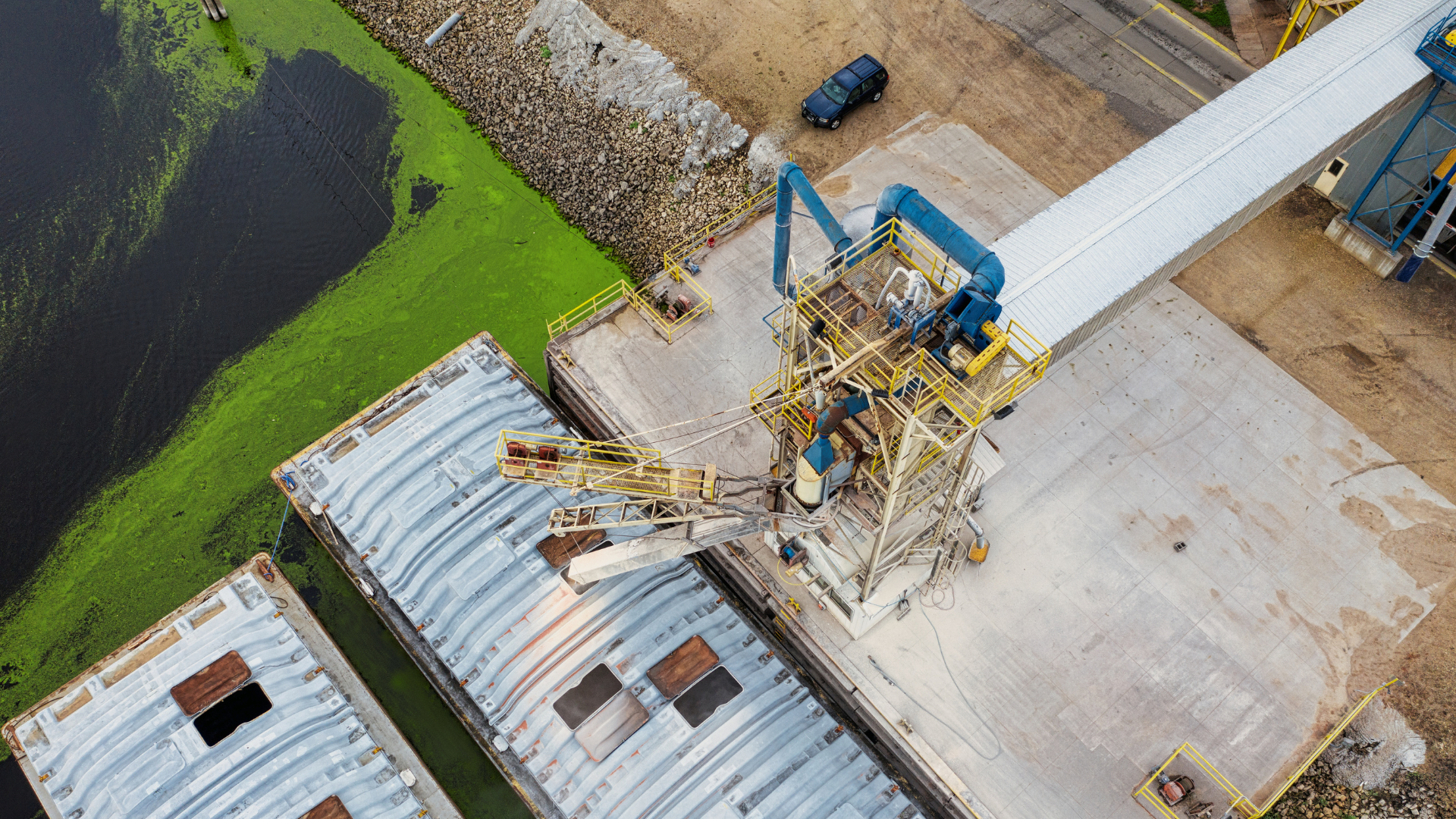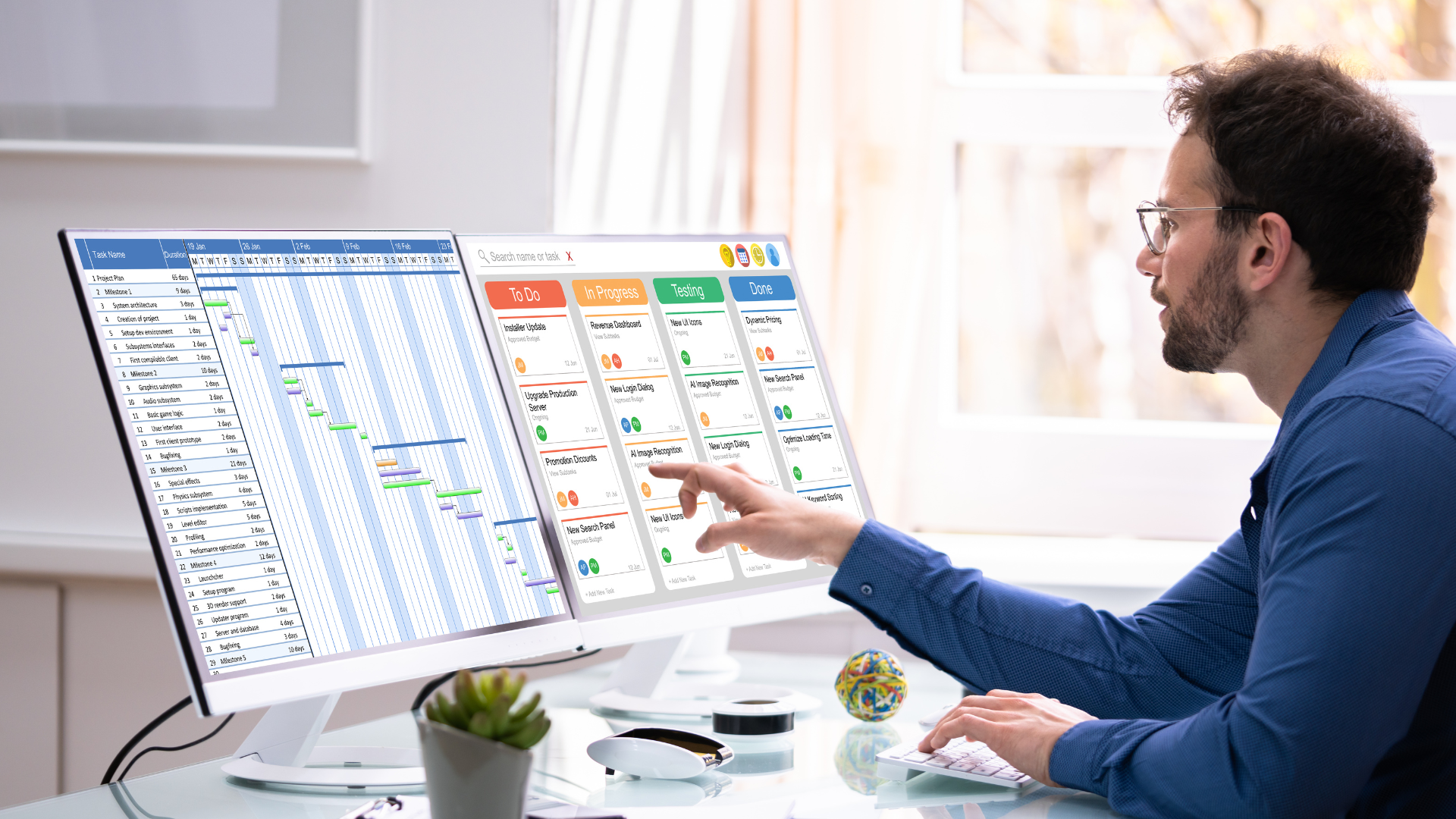Audio overview: Listen & Learn
Running a small construction business means wearing many hats. You’re chasing leads, managing crews, handling change orders, and keeping clients updated.
Without a system to organize it all, things slip. Jobs get delayed. Leads go cold.
A construction CRM helps you stay on top of every detail, from quotes to job progress, in one place, benefiting construction firms.
If you want to grow without the chaos, a CRM is no longer optional. It's a necessity.
Why Construction CRMs Are a Must for Small Builders
Ask any small builder, and they’ll tell you wearing all the hats is exhausting. From lead management to crew scheduling to handling customer change orders on the fly, it’s easy to get buried in day-to-day operations. Add in back-and-forth texts, scattered spreadsheets, and missed follow-ups, and things quickly become overwhelming.
Construction CRM software is designed to fix exactly that. Unlike generic tools, these platforms are specifically designed for the construction industry, with workflows tailored to the way small builders operate.
In short, if you're a residential builder or small contractor trying to stay competitive and profitable in 2025, a CRM isn’t just helpful, it’s how you take control of your entire pipeline and run a leaner, more innovative business.
Key Takeaways:
- A construction CRM helps small builders stay organized by managing leads, quotes, change orders, and job progress, all in one place.
- Missing follow-ups or project details can cost you jobs. A CRM ensures nothing slips through the cracks.
- Unlike generic CRMs, construction CRMs are purpose-built for workflows like scheduling crews, handling construction change orders, and tracking job stages.
- Construction CRMs help manage change requests without compromising profit by tracking approvals, updating budgets, and maintaining clear documentation.
What Is a Construction CRM (and How Is It Different from Generic CRMs?)
CRM stands for Customer Relationship Management. But in construction, it’s more than managing client names and phone numbers.
A construction CRM is designed specifically for contractors. It includes tools for the entire pipeline: job tracking, quoting, scheduling, and communication.
Generic CRMs, such as Salesforce or HubSpot, may help with contract management, but they weren’t designed for the construction process. They don’t handle change orders, subcontractor scheduling, or job site coordination.
Constructionbase, for example, is tailored to how construction companies manage work, from lead to job completion.
The Top Challenges Small Builders Face Without a CRM
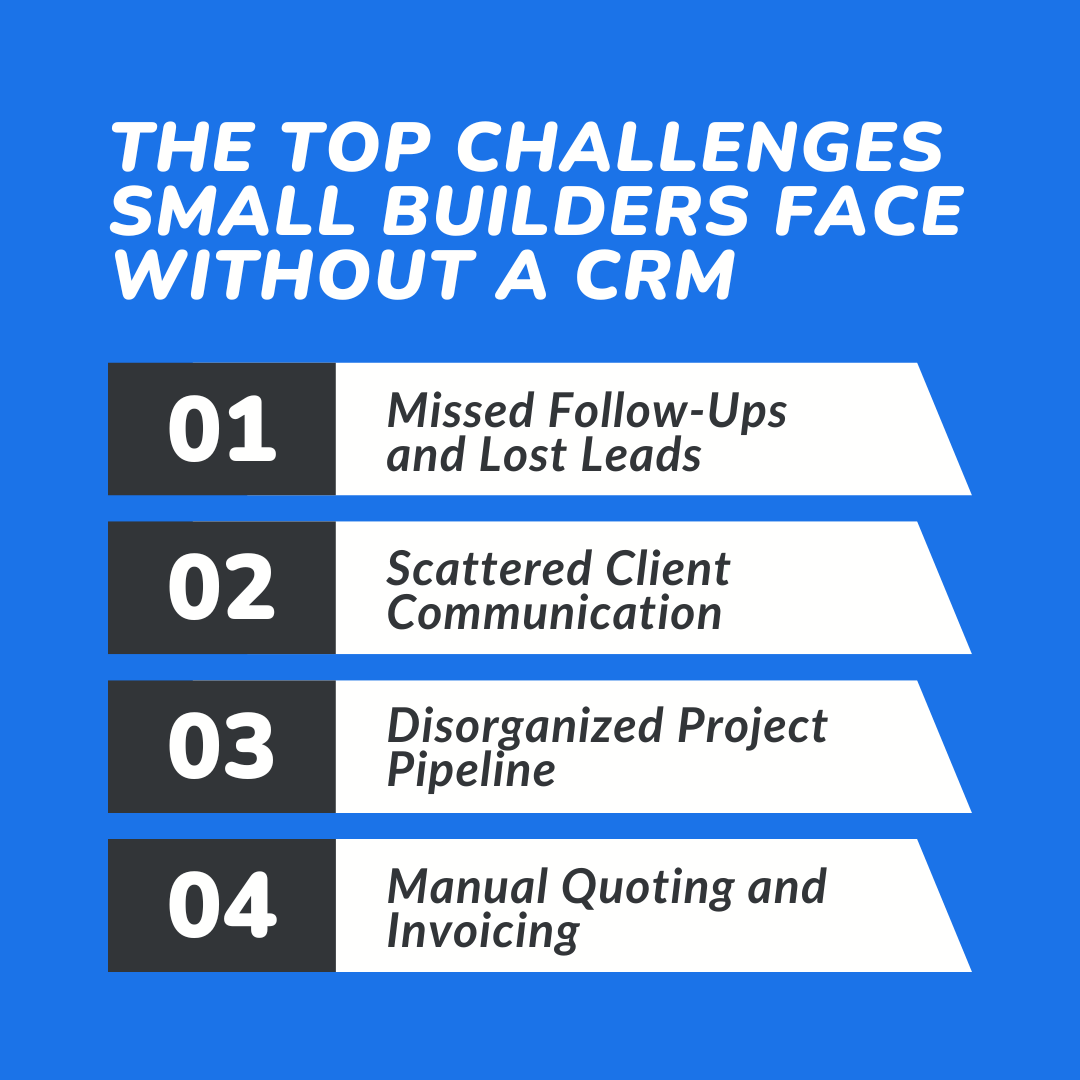
1. Missed Follow-Ups and Lost Leads
Leads come from everywhere: calls, websites, referrals, and even walk-ins. But without a centralized system like a construction CRM, they easily get buried in emails or texts.
Failing to follow up can result in losing the job to someone else. A construction CRM helps track every lead, strengthen client relationships, organize your sales process, and improve your close rate.
2. Scattered Client Communication
Clients often send updates through various channels, including calls, messages, and emails. Without a CRM for construction to manage customer interactions, it’s easy to miss something or get details wrong.
A construction CRM software keeps all communication and approvals in one place, helping you avoid rework and keep the project moving smoothly.
3. Disorganized Project Pipeline
Without a clear system, it’s challenging to determine which jobs are active, delayed, or awaiting action. That means wasted time and missed opportunities.
Using a builder's pipeline CRM gives you a snapshot of all jobs, so you can plan better, manage your construction teams, and keep your projects on track.
4. Manual Quoting and Invoicing
Manual quotes generated using spreadsheets are slow and prone to errors. A missed cost or outdated pricing can cut into your profits.
With CRM software, you can quickly create accurate quotes and track changes. It speeds up approvals and helps you get paid faster.
To exactly know why you need construction CRM, have a look at Why Construction CRM Is Critical (Not Just Optional) in 2025
7 Benefits of Using a Construction CRM as a Small Builder
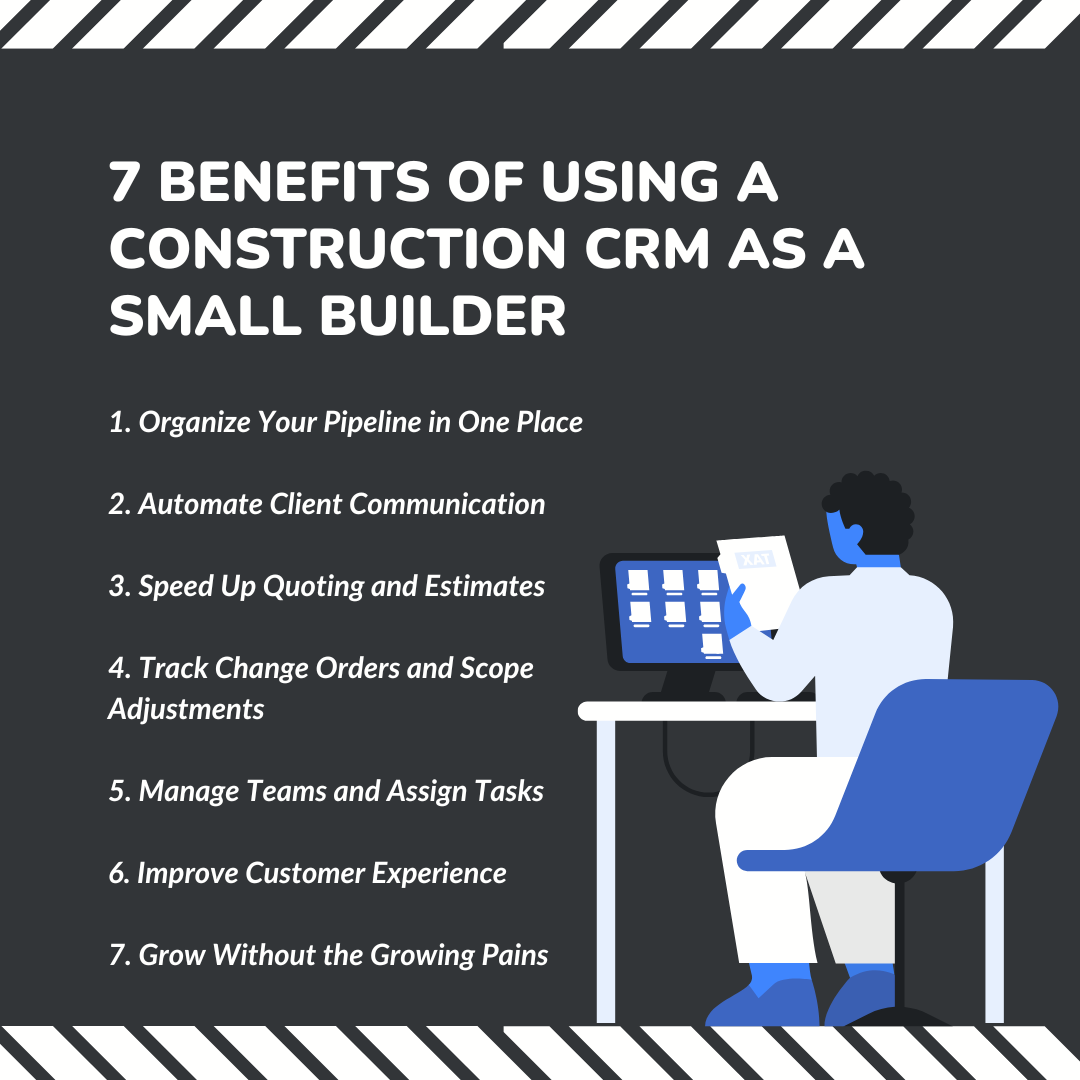
1. Organize Your Pipeline in One Place
Managing multiple projects without structure can quickly become chaotic. A construction CRM gives you one centralized system for effective lead management to track every lead, job, and task.
You can filter jobs by stage, crew, or project type. Whether it’s a roof replacement or full home build, you’ll always know what’s active, pending, or ready for invoicing.
This makes it easier to manage projects, save time, prioritize your day, and avoid things slipping through the cracks.
2. Automate Client Communication
Staying in touch with clients is crucial to a positive construction experience, but constant phone calls and manual updates can consume your time.
With construction CRM software, you can automate routine communication. Set up automatic reminders, approval requests, or progress updates via email or SMS.
This not only keeps your customers informed, but it also frees you up to focus on managing your team and job sites.
3. Speed Up Quoting and Estimates
Manual quoting requires time and creates repetitive tasks, which can lead to errors. A CRM for construction streamlines processes with templates and customizable fields.
You can build accurate estimates quickly using your stored pricing for labor, materials, and equipment. That means fewer delays, more bids sent out, and more jobs won.
Additionally, your quotes appear clean and professional, which helps you establish trust from the outset.
4. Track Change Orders and Scope Adjustments
Projects rarely go exactly as planned. Clients often request changes, and if you’re not tracking those updates properly, your profits can take a hit.
A construction CRM logs every change order in real-time, allowing you to track historical data. Approved updates automatically adjust the budget and scope, so your financial management stays accurate.
You’ll avoid disputes, protect your margins, and keep the project on track without having to dig through old emails or paper notes.
5. Manage Teams and Assign Tasks
Construction companies manage crews, subs, and vendors, sometimes all at once. Without a system, assigning tasks gets messy.
With a builder's pipeline CRM, you can assign jobs with a few clicks. Everyone knows where to be, what to do, and when it’s due.
This reduces downtime, improves team performance, and ensures your construction teams stay aligned from day one.
6. Improve Customer Experience
Clients want transparency. They like knowing what’s happening and when it will be done.
With CRM software, you can provide real-time updates, progress photos, or even access to customer portals. That visibility fosters trust and alleviates stress for both parties.
Happy customers are more likely to refer you, pay faster, and return for future work.
7. Grow Without the Growing Pains
As your construction business grows, staying organized becomes harder. More projects mean more moving parts, but that doesn’t mean you need to hire a huge back office.
A construction CRM helps you streamline processes, improve business performance, and enhance your decision-making with accurate data. You can scale from 5 to 50+ projects without losing control.
From lead management to daily logs and invoicing, the right CRM software supports every aspect of your operation, enabling you to grow smarter, not just bigger.
Signs You’re Ready for a Construction CRM
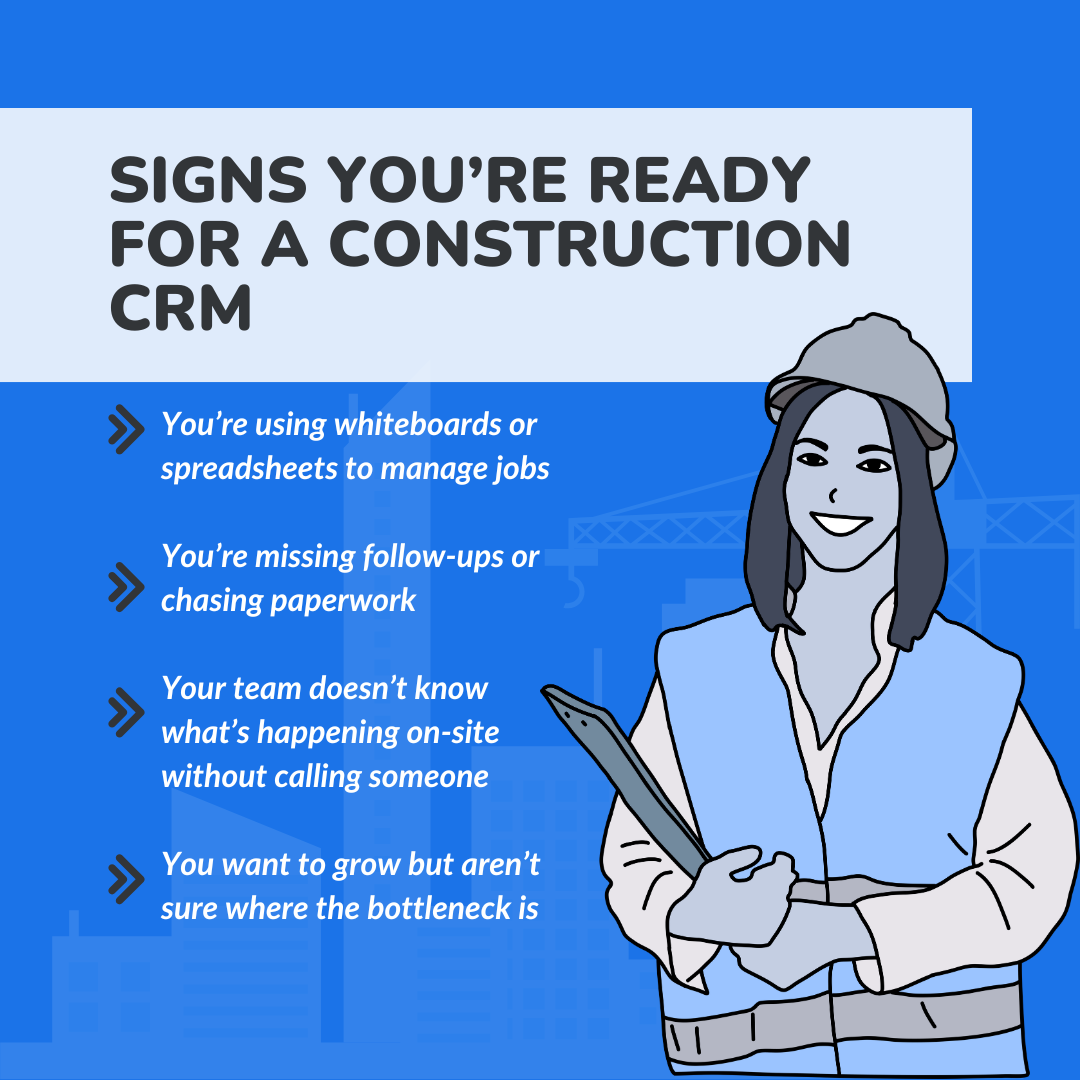
1. You use spreadsheets, whiteboards, or sticky notes to manage jobs.
If you're still tracking jobs on spreadsheets or whiteboards for project management, it's only a matter of time before things slip through the cracks.
As your construction business grows, managing your pipeline manually becomes messy. A construction CRM brings everything into one place so you can manage projects without chasing updates or digging through paper.
2. You forget to follow up with leads or respond to client messages.
Leads are coming in, but you're losing them and missing potential customers because follow-ups get buried in texts or emails.
CRM software helps automate your sales process with reminders and organized communication tools. You’ll never miss a lead or a client message again.
3. Your team doesn’t know the job status unless they call or text you.
If your crew constantly needs to call you for updates, it’s slowing everyone down.
A CRM for construction enables your team and contractors to view schedules, tasks, and job progress in real-time, keeping them aligned without the need for back-and-forth communication.
4. You want to grow, but don’t know where the slowdown is.
You’re ready to take on more jobs, but your system can’t keep up, and you’re not sure why.
A builder's pipeline CRM provides visibility into where projects stall, enabling you to make data-driven decisions and streamline processes.
If any of these sound familiar, it’s time for a better system.
A construction CRM can help you manage leads, jobs, teams, and client communication all from one centralized platform.
For a deep knowledge of construction CRM, read this: How Modern Construction CRM Tools Are Changing Client Communication.
What to Look for in a Construction CRM (for Small Teams)
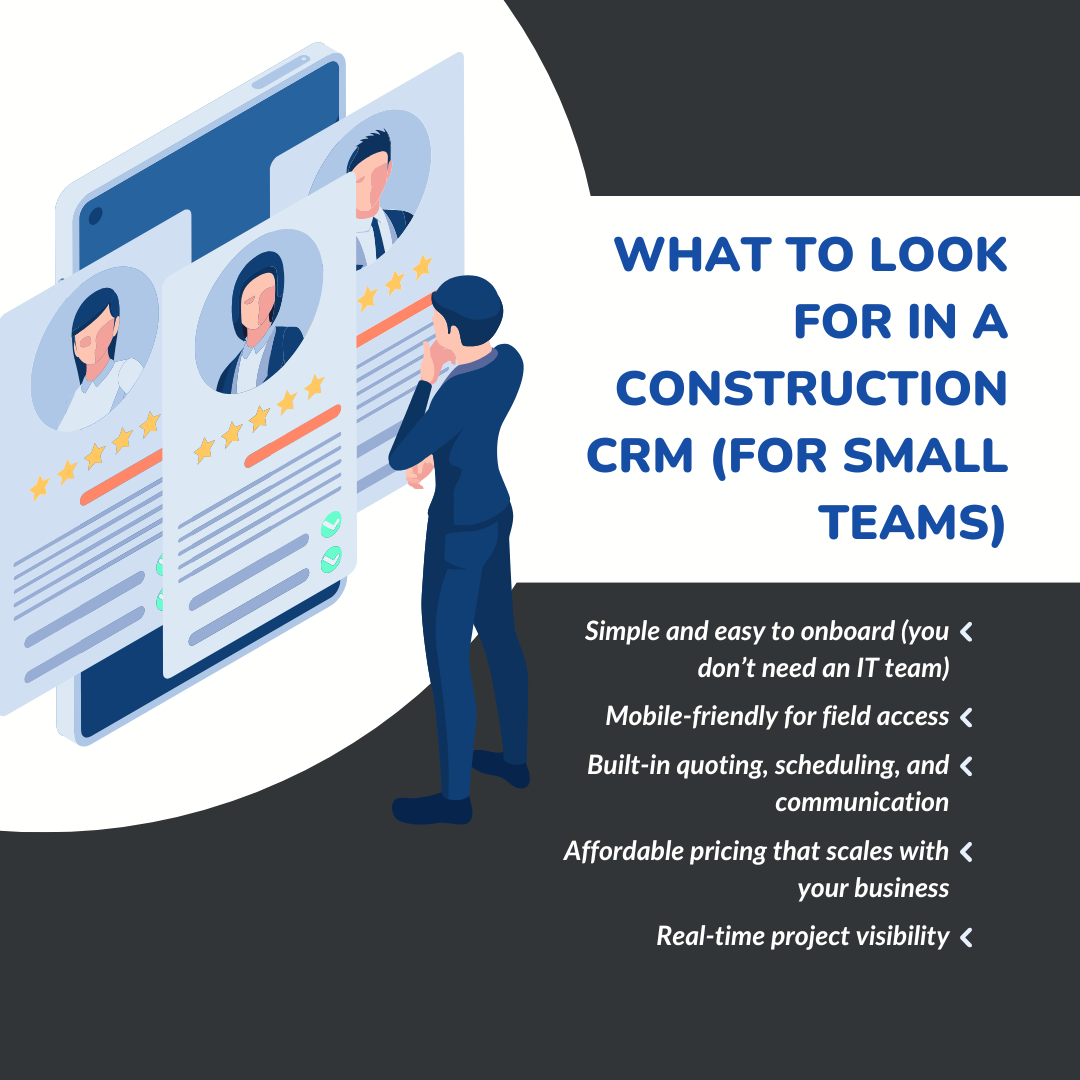
1. Simple and easy to onboard (you don’t need an IT team)
Your CRM should be easy to set up and use. Small construction teams don’t have time to deal with tech headaches.
Look for a user-friendly interface, clear instructions, and fast onboarding so your crew can focus on jobs, not learning software.
2. Mobile-friendly for use on the job site or in the field
Your team works in the field, not behind a desk. A mobile-friendly CRM lets them update job progress, upload photos, and check tasks from anywhere.
It keeps everyone aligned and reduces calls and confusion.
3. Built-in quoting, scheduling, and communication tools
The best construction CRM combines quoting, scheduling, and communication into a single system.
You can create accurate estimates, assign tasks, and message your team or clients all without switching between tools.
4. Affordable pricing that grows with your business
Look for CRM software that’s built for small teams but can scale with your business. You shouldn’t pay for features you don’t use.
A flexible, budget-friendly plan allows you to scale without straining your finances.
5. Real-time visibility into job progress and project planning
Knowing what’s happening across all projects helps you stay in control.
A CRM with real-time tracking displays job status, delays, and team assignments, enabling you to plan more effectively and make faster decisions.
Why Constructionbase Is the CRM Built for Small Builders
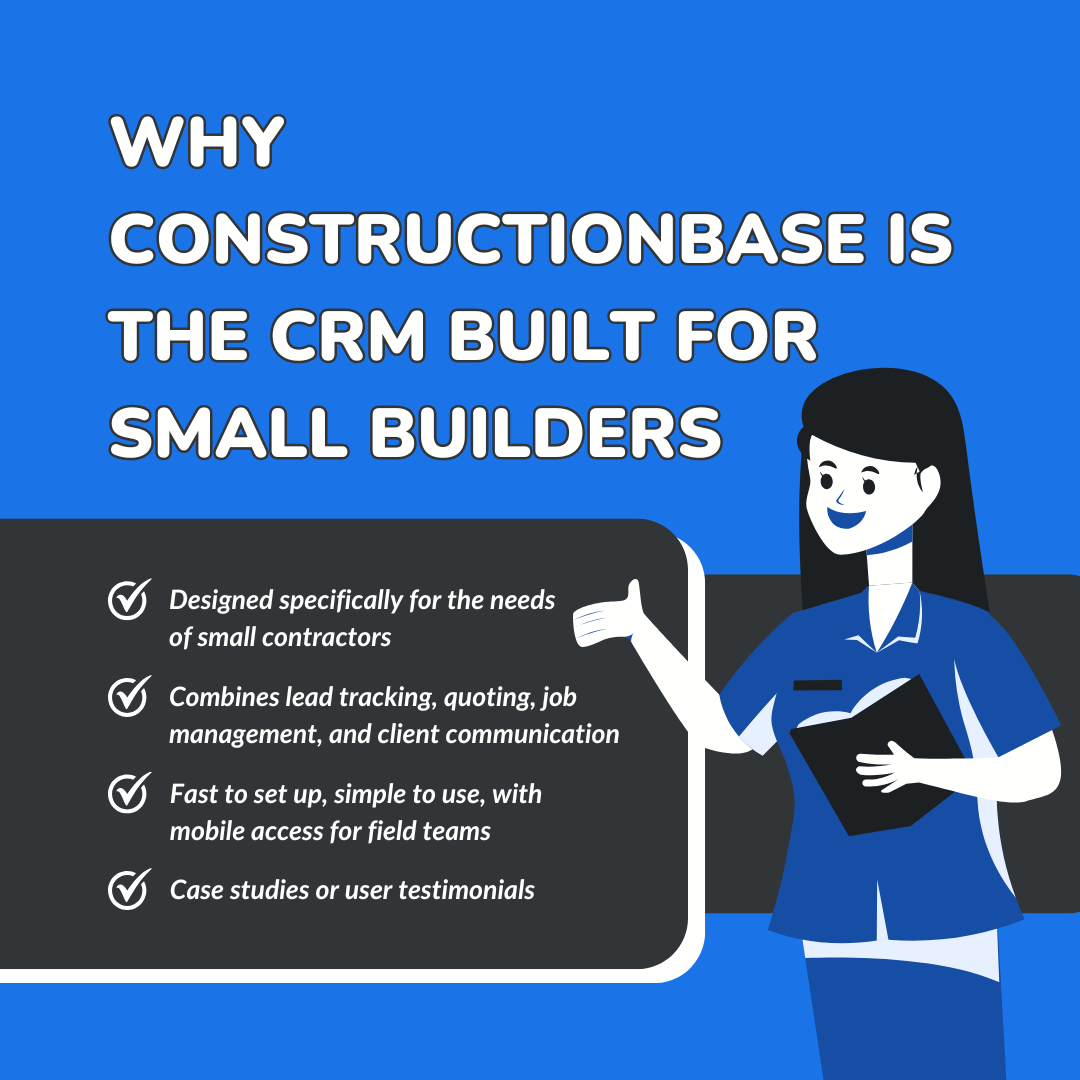
Constructionbase was made with small builders and general contractors in mind.
It helps manage your entire business from one platform:
- Track leads, quotes, and signed contracts
- Schedule crews and manage daily logs
- Handle change orders and approvals
- Track job progress in real time
- Communicate with clients and get paid faster
It’s a user-friendly interface that your team can learn quickly. Plus, it offers a mobile app to keep your field teams connected.
You can finally manage your entire pipeline without juggling five different tools.
Conclusion
A CRM isn’t just for big construction companies; it’s the secret weapon small builders use to stay lean, organized, competitive, and drive revenue. It’s the secret weapon small builders use to stay lean, organized, competitive, and drive revenue.
It helps streamline processes, improve communication, and give you the structure to handle more jobs.
You don’t have to scale alone. Let the right construction CRM software help you increase productivity, run your entire business with more confidence, and less chaos.
Ready to Ditch the Spreadsheets and Take Control of Your Projects with Constructionbase?
Constructionbase gives you everything you need to manage leads, jobs, teams, clients, and even online payments, all from one simple dashboard.
No IT team needed. No fluff. Just tools that help you win more bids and finish jobs faster.
Book your demo with Constructionbase today and build smarter, not harder
FAQs
Do I need a construction CRM software if I only have 3-4 jobs a month?
Yes. A CRM helps you stay organized now and grow with fewer headaches later.
How hard is it to switch from spreadsheets?
It’s not. Many CRMs let you import data and get set up in a few hours.
Will it help if I don’t do a lot of marketing?
Absolutely. Even word-of-mouth leads need to be tracked and followed up on.
What if I’m not tech-savvy?
Look for a CRM with a straightforward layout and a helpful onboarding process to help you make smarter decisions. If you can send a text, you can use Constructionbase.
Have questions or need personalized advice?
Talk to an Expert Today and let our construction specialists guide you to success.


